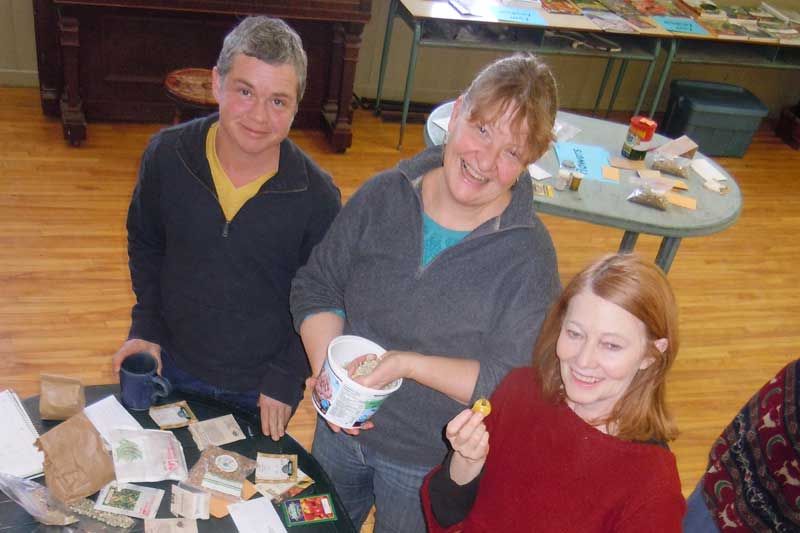Feb 14, 2013
The recent blast of winter storms have in no way deterred enthusiastic growers from setting their sights on their farms and gardens this spring. At the MERA school house on February 9, the second annual seed swap took place and growers had a huge variety of seeds to choose from. Three tables were set up in MERA's main hall and guests were invited to take and donate seeds, all in order to share the wealth of a number of heritage and open-pollinated varieties of flowers, herbs and vegetables.
Organized by Kristine Swaren of Blue Chicory Garden and Simon Lever of Windblest Farm, the event attracted growers from far and wide looking for new and interesting varieties of plants to grow. In the soup bean category there were Arikara beans, a drought-resistant yellow soup bean that many growers were interested in due to last summer's drought conditions.
Expert growers of medicinal herbs donated a variety of seeds that piqued the interest of attendees. These included Feverfew, a medicinal herb that treats headaches, and Calendula, which is often used in skin creams and whose flowers are thought to relieve the winter blues. Growers also scooped up seeds of Holy Basil, an East Indian strain of basil that is known to be both anti-viral and energizing.
In the flower department there was Milk Thistle, a beautiful ornamental flower that can be used to make a tea that is good for the kidneys. At the veggie table growers were introduced to Floriani Red Flint corn, a variety of corn, which is not grown to eat fresh but to make corn flour.
There was also a interesting variety of tomato called Giallo a Grappoli, which the donor picked in the fall and then set in a cool garage where it was harvested throughout the winter months.
Seed swaps are especially useful for gardeners looking to preserve heritage plants and wanting to learn about new and interesting varieties of plants, veggies and flowers. As Kristine explained. “A lot of these growers have saved these seeds from plants they themselves have grown. So the varieties you see here are either open pollinated or heritage varieties, not hybrids. Hybrid seed cannot be grown again and come true to type. So basically what people are doing here is preserving heritage varieties.”
One grower reminded seed takers with a note on her packet of seeds that said, “Please take only if you are serious about growing this out and returning the seeds to the swap in two years' time.”
There were numerous seeds of plants that growers are no longer able to find in seed catalogues, like Hollow Crown parsnip and also Multi-star peas.
Kristine explained that growers will often attend seed swaps prior to ordering seeds through catalogues. “What I tend to do is make a wish list of all the seeds that I want to buy and a lot of them I have been able to find here so I do not have to order them. So not only are you getting the seeds for free but you are also able to talk to those who have grown them and learn a lot from their experience.”
Simon Lever found some herb and bean seeds that he has an interest in establishing at his farm, so he was really excited by some of those varieties.
Organizers are planning to run a seed saving workshop later in the summer at MERA due to the expression of interest from numerous growers. For those who missed the MERA swap, have no fear. Many of the participants will be attending the Seedy Sunday seed swap, which will take place at the Perth Legion on Sunday March 3.
More Stories
- Province clarifies stance - Says Private Well Water Testing Will Continue
- Frontenac County Stays Internal for CAO - Appoints Kevin Farrell
- Addington Highlands Tax Bill Going Up 6.93%
- Perth Road United Church Donation to The Grace Centre
- 21 Years Of Dump Life Left At South Frontenac Waste Site
- Eclipse 2024 – Once In A Lifetime
- National Tourism Week
- NeLL Spring Open House and Anniversary Concert
- 25 years at Bishop Lake Outdoor Centre
- Grounds Contracts Down, Custodial Contracts Up In Central Frontenac

